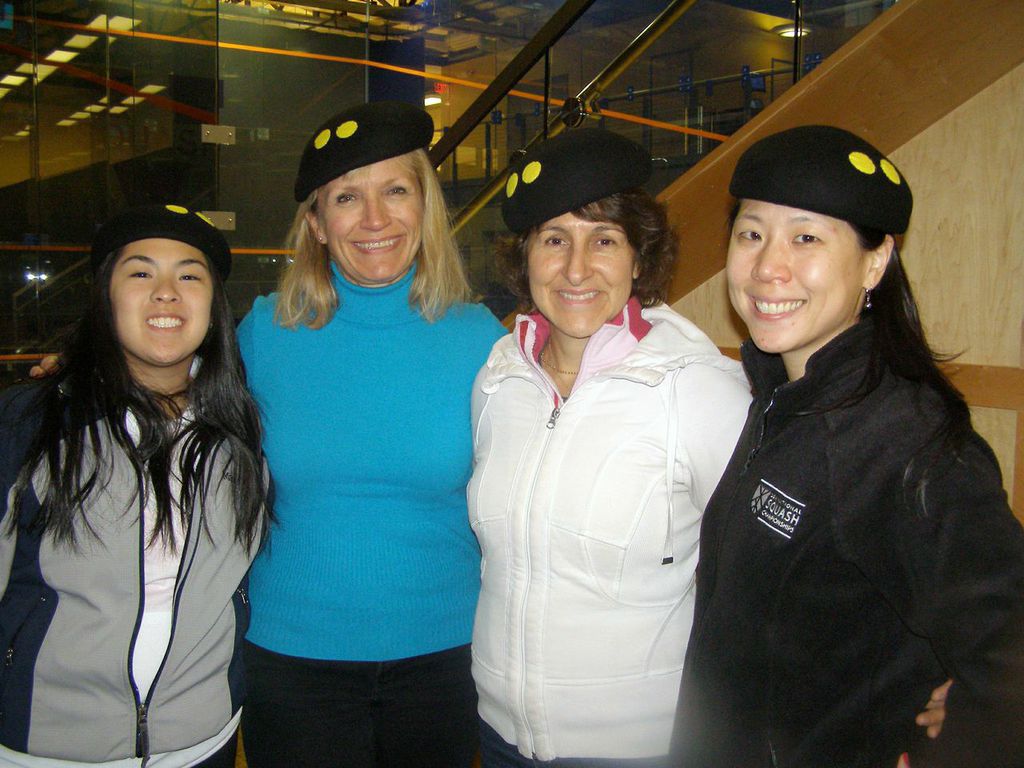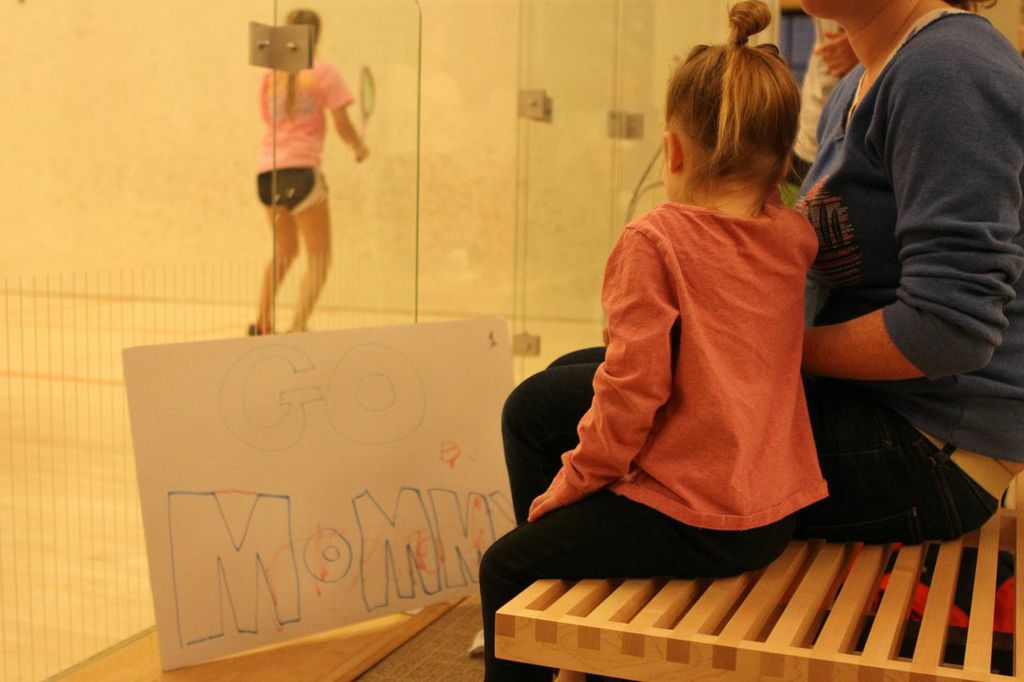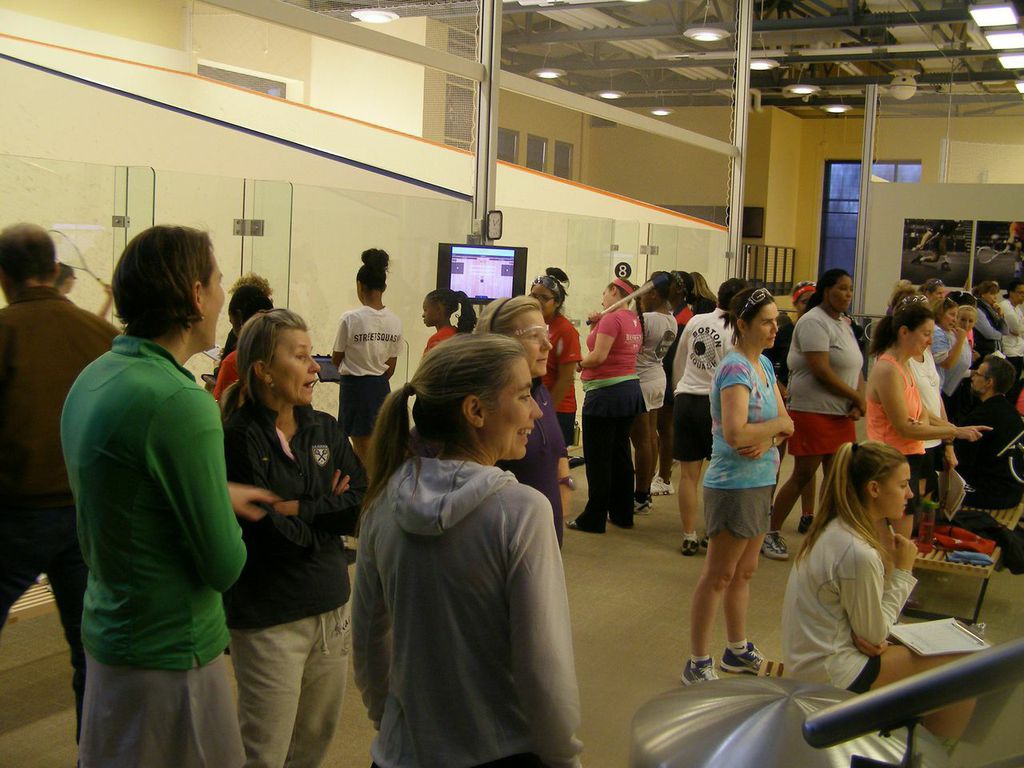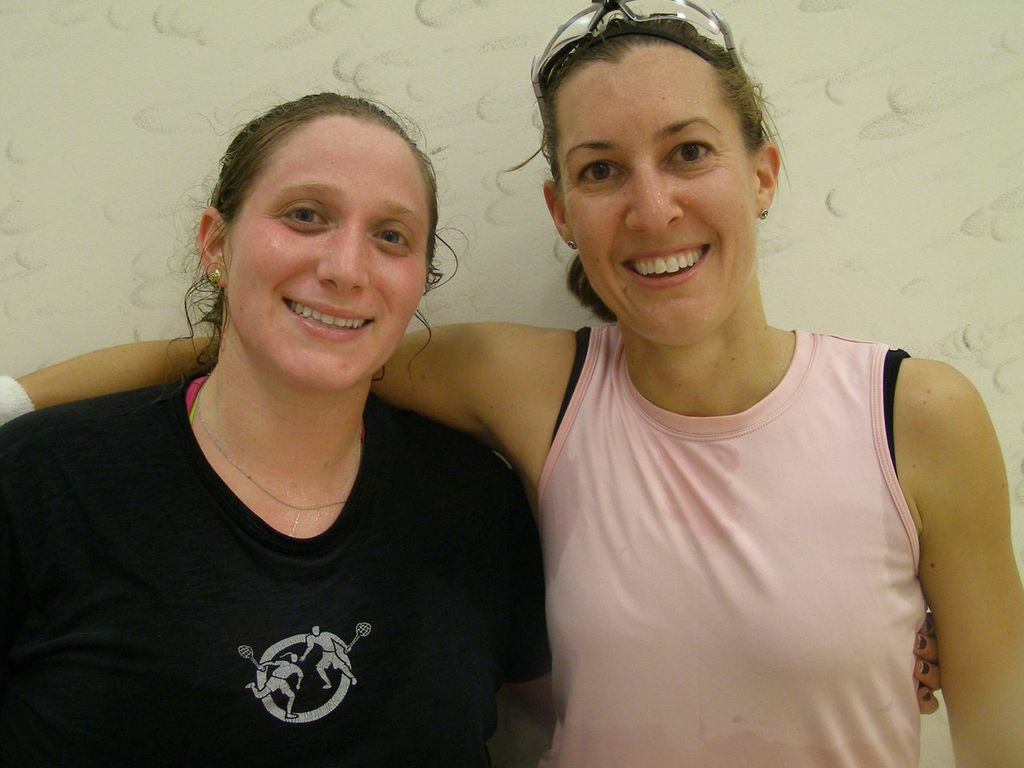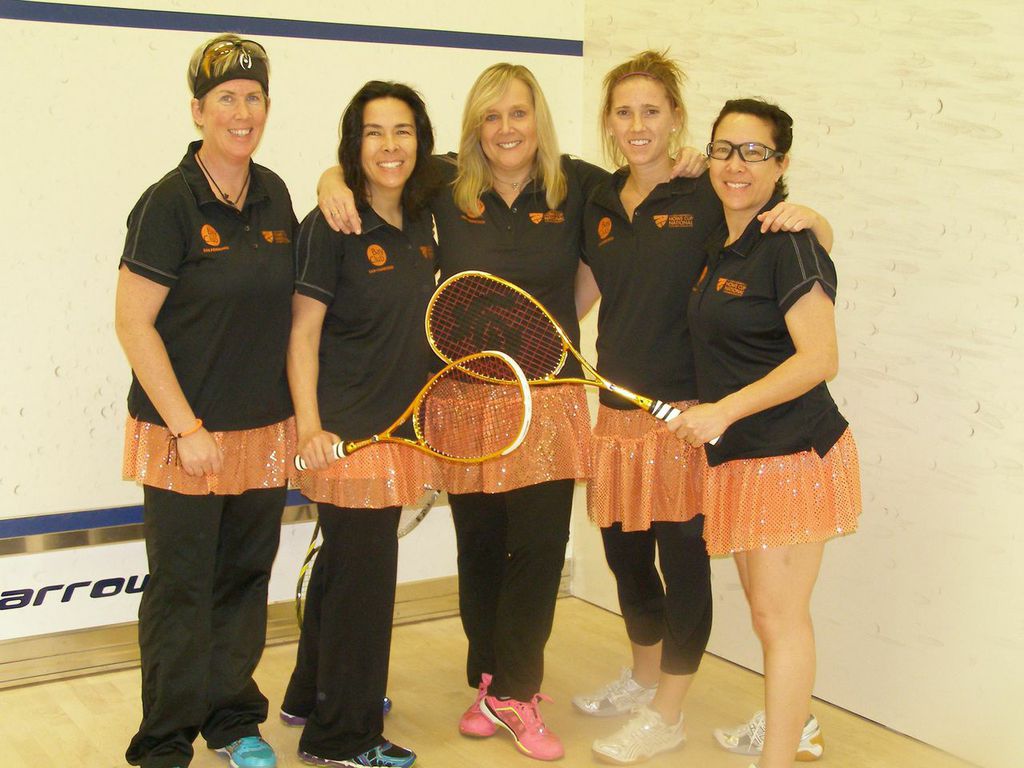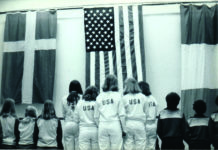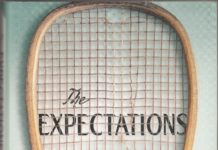By Beth Rasin
There were the warm embraces of friends who hadn’t seen each other for a year or more; there were the team outfits that glittered and sparkled; there was a visit from Mr. Jefferson, the founder of the University of Virginia, home of the MacArthur Squash Center; there was a Saturday night dance party which featured swing, Motown, modern pop, line dancing and the limbo; and there were three days packed with squash matches to determine the 2014 Howe Cup Women’s National Team champions.
The competition was fierce—whether it was the down-to-the wire fifth game between the Four Corners Casey Wong and Philly’s Alicia Rodriguez-Acosta in the A championship or the 23-21 fourth game between NY Rangers’ Sasha Diamond Lenow and Charlottesville’s Allie Hill on the last day when neither team was still in the title hunt. The 150 singles players and thirty doubles players came to play—and Tournament Director Kim Clearkin made sure that the draws were set up to maximize the number of matches. For Boston’s Sue Greene, that meant
five singles matches as the No. 1 player on Boston’s Boast Town Babes B team and three matches in the A doubles draw with partner Julie Kessler.
The players came from all over the U.S., and Canada was represented by the Northern Knickers and the Cabernet Canucks who have become Howe Cup die-hards. “I reluctantly came to my first Howe Cup several years ago; the team organizer had to give me her airline miles to persuade me,” said one of the Canucks. “Now I wouldn’t miss it for the world.” Some women had just picked up the game in the last year; others have returned to play after years away, and then there were stalwarts like DC’s Carole Grunberg who have been playing Howe Cup steadily since the 80s. Wherever they come from, and however long they have been playing, the Howe Cup players share a love of the game—amply demonstrated by their on-court grit, the permeating ethos of fair play and ebullient post-match celebrations.
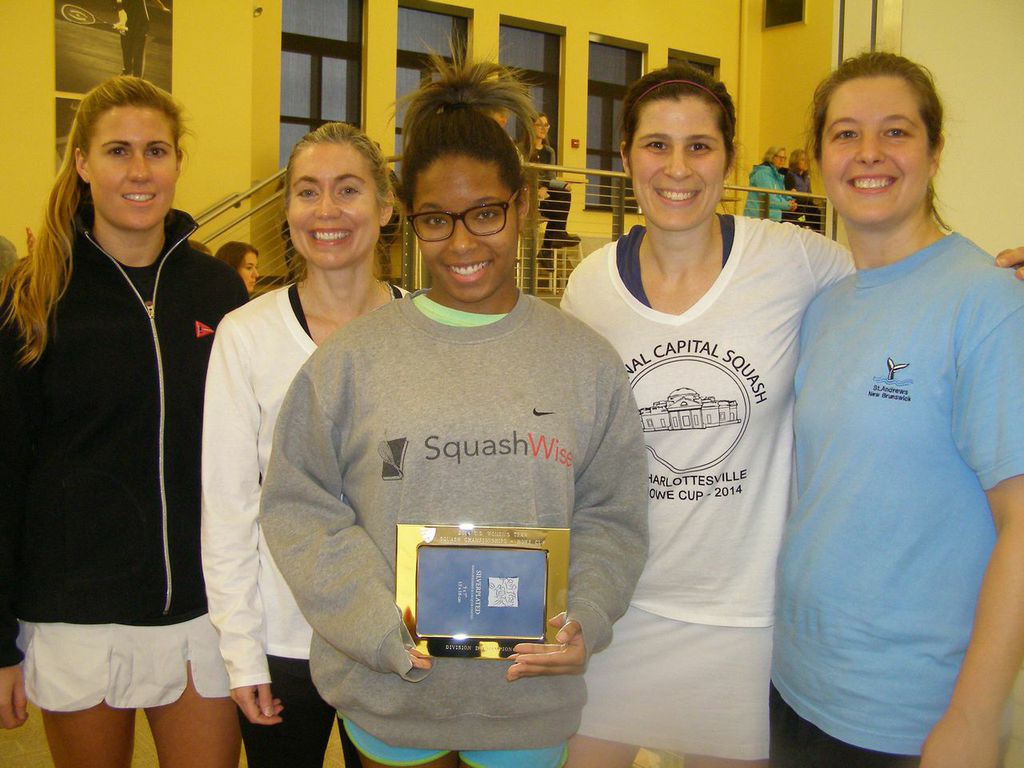
DC DARLINGS ARE D CHAMPS
Both the DC Darlings and Boston D-vas came into Sunday’s final match in the D round robin undefeated; the DC Darlings claimed the title with a 4-1 victory. The not-so-aptly named championship team (they were darling but not all from DC) was actually comprised of players from DC, Baltimore and Pittsburgh Team Captain Abby Markoe (second from right) who started playing in middle school with her Dad, and played for George Washington University in her senior year. After moving to Baltimore to pursue a graduate degree in the History of Medicine at Johns Hopkins, Abby founded SquashWise in 2007. One of SquashWise’s first program participants, Taylor St. Clair (middle), joined Abby on the team. “SquashWise has helped to shape my life and get me to the place where I am supposed to be,” says Taylor, a senior at Baltimore Polytechnic Institute. Taylor was thrilled with her “first big tournament win” and especially liked “coaching the coach” as she gave advice to her mentor Markoe during matches.
“I had been wanting to learn to play squash ever since college,” said Pittsburgh’s Martha Shaindlin (second from left). “I had a philosophy professor at Brown who was also the No. 1 squash player in the state, and I was intrigued that an older person with a full-time job could also be a top athlete in his sport.” Playing viola in the orchestra at Brown didn’t leave time for squash. After her first lesson this past January, Martha was hooked.
The DC part of the team was represented by Anneka Wisker (left) and Ainsley Stapleton (right), each of whom picked up the game in high school, and then put their racquets down for several years. There wasn’t much squash for Anneka at Sewanee University, but when she moved back to DC in 2012, she wanted to work out and knew squash would be more fun than just going to the gym. There was no girls’ team at George Washington when Ainsley went to school there, so she took up racquetball. Nearly twenty years and three kids later, Ainsley started playing again just four months ago at the Mclean Racquet Club which is just one block from her office, enabling Ainsley to get a great lunchtime work out. “Mona Butterfield badgered me until I said I would play Howe Cup and it has been an amazing experience.”
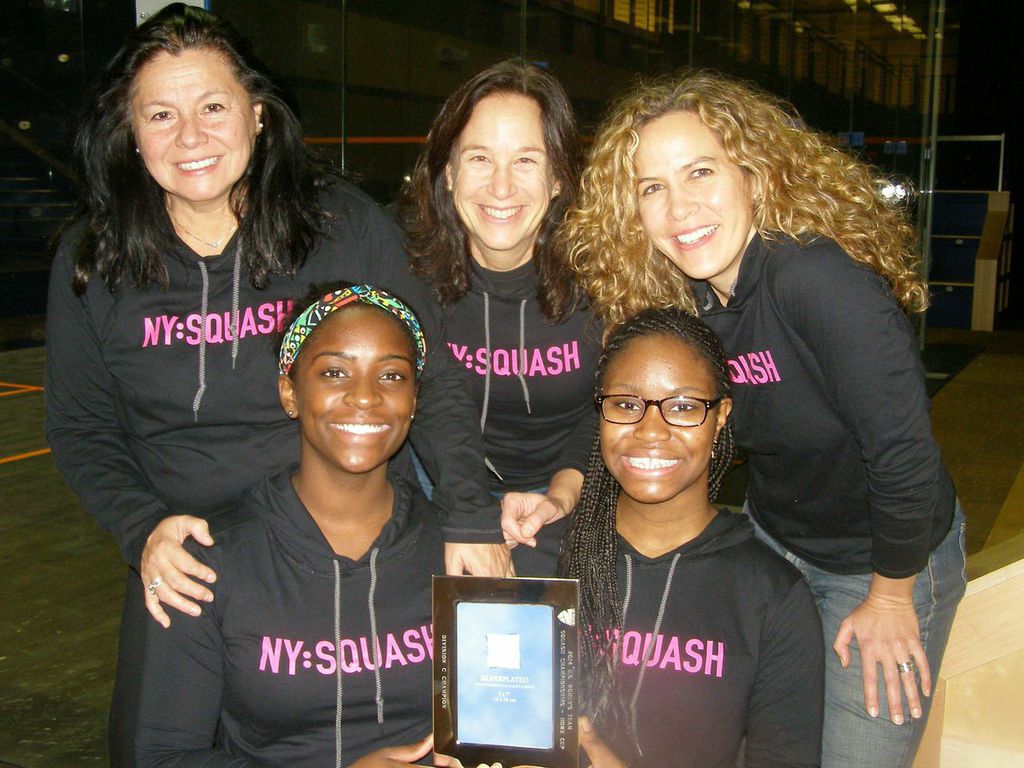
BROOKLYN CYCLONES SWEEP THE CS
Persistence (as in more than two decades of playing Howe Cup) paid off for three wily veterans who joined forces with two StreetSquash teenagers to claim the Howe Cup C championship. After eking out 3-2 wins over Philly and DC Cover Girls, the Brooklyn Cyclones defeated Charlottesville 4-1, and claimed the championship with a resounding 5-0 win over UVA.
Lorraine Bates (back left), a former private investigator turned teacher, was introduced to the game by a colleague in NYC in the 80s, and stayed with it after moving to Binghamton, NY. Kathy Mintz (back middle) was a tennis player who picked up squash in 1978 at Wesleyan in her senior year. “I started at No. 24 of twenty-four on the team and worked my way up to No. 12,”she recalled. Howe Cup novice Joetta Francis (front left), a StreetSquash high school junior, won three of her four matches and loved the fact that Howe Cup is “all girls.”
Noted “Squeakyfeet” blog writer and children’s book editor Tracy Gates (back right) and StreetSquash teenager Djeneba Ballo (front right) anchored the team with undefeated records. Tracy, who taught herself to play squash at her local YMCA in the 80s and is now a diehard player at NY’s CityView Racquet Club along with teammate Mintz, was delighted with the coaching she got from Djeneba. The high school junior says she was a ”copycat” when she joined StreetSquash to follow older sister Mawa, who was playing her first Connecticut College match during Howe Cup weekend. “I think we could be the Venus and Serena Williams of squash,” says Djeneba.

CALIFORNIA GIANT SPARKLE GRABS THE B TITLE
The California Giant Sparkle glittered their way through the B Draw, wearing orange-sequined skirts and winning some tight matches in the early going to make it to the finals. After squeaking by the Connecticut Barn Louses and National Capital B1 and B2 with 3-2 match wins, the California girls (by way of Jamaica, Ireland, and England) claimed a 4-1 victory over the Northern Knickers from Canada. It was all California in the Sunday final, as they defeated UVA across the board.
Anchoring the team with undefeated records were 2014 Sportsmanship Award winner Orla O’Doherty (left), the lead squash professional at the Santa Barbara Athletic Club and Astrid Terry (second from left), who played squash as a junior in Jamaica before coming to California for college. Astrid’s twin sister Gwyneth (right) played the most dramatic match in Sunday’s final, coming back from being down two match balls in the fifth game against Charlotte Searle to win the game 13-11 and get her team off to a winning start. For Gwyneth, as meaningful as being on her first Howe Cup championship team, was coming back to the game after a threeyear injury hiatus. Joining the California crew for the first time was Dory Gannes (second from right), a native of Palo Alto who started playing squash in grad school and played Howe Cup for DC for the past two years before returning to the West Coast to work for the Silicon Valley Community Foundation as a development officer. The mastermind who put together the team is none other than Tournament Director Kim Clearkin (middle), head professional at the San Francisco Bay Club, who originally played badminton at Oxford University, before finding her way onto the squash courts.
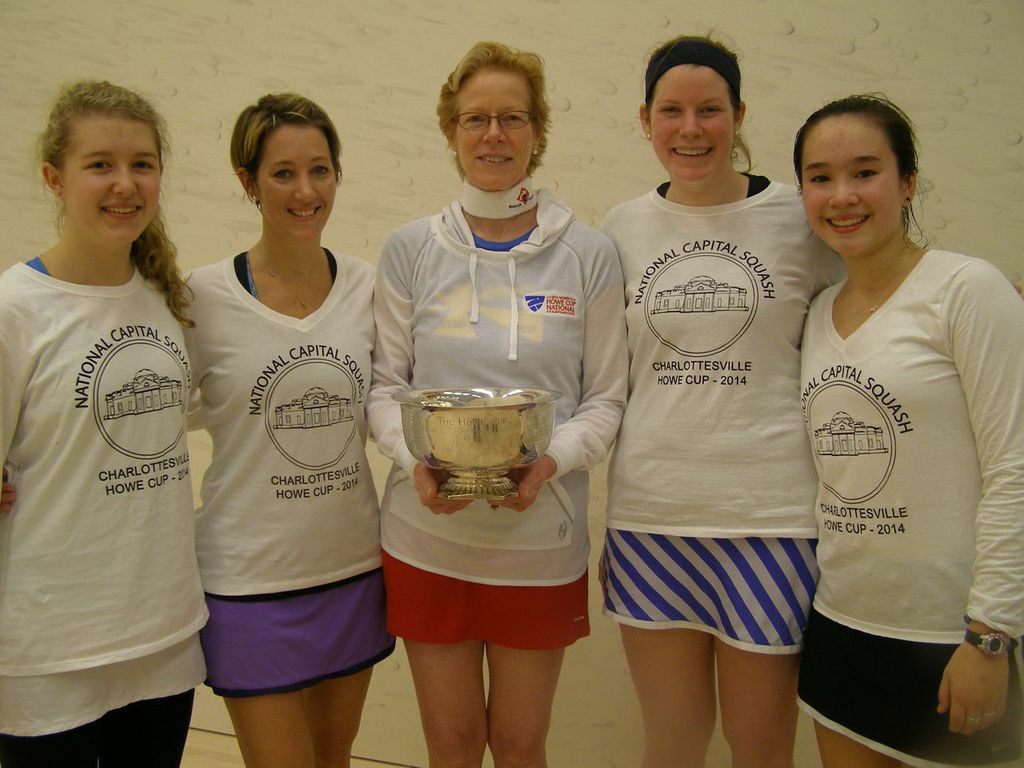
THE FOUR CORNERS
The depth of talent in the Women’s A division made for some very exciting and close matches, as well as offering inspiration to all the other Howe Cup division players. It was fitting that the very last match of the championship weekend went the distance with sixteen-year-old Casey Wong (right) defeating Alicia Acosta Rodriguez of Philadelphia (by way of Mexico and Trinity College) in five tough games. The teenager is already a seasoned player, having started when she was nine and playing for the U.S. Women’s Junior National Team at the Junior World Championships in Namibia this past summer. (She also played in the A doubles with her mother Pat.) Another teenager, sixteen-year-old Isabel Young (left) who plays at the Potomac School, got the Four Seasons off to a winning start when she defeated Allie McGee, a Boston based eaching pro, 3-0. Allie Rubin (second from right), a Williams College grad, put another point on the Four Seasons board when she beat Philly’s Julie Kessler, 3-1. Toronto native and Penn grad Radhika Cobb got Philly in the running with a 3-0 win over Mei Lin Ong (not pictured). The seasoned veteran Larissa Stephenson (second from left), a New Zealander who played for Trinity and is a touring and teaching pro out of Houston, clinched the big bowl for her team with a 3-1 victory over Nabilla Ariffin, who was a top Malaysian junior before attending U. Penn. (Captain AJ Copeland is holding the bowl).
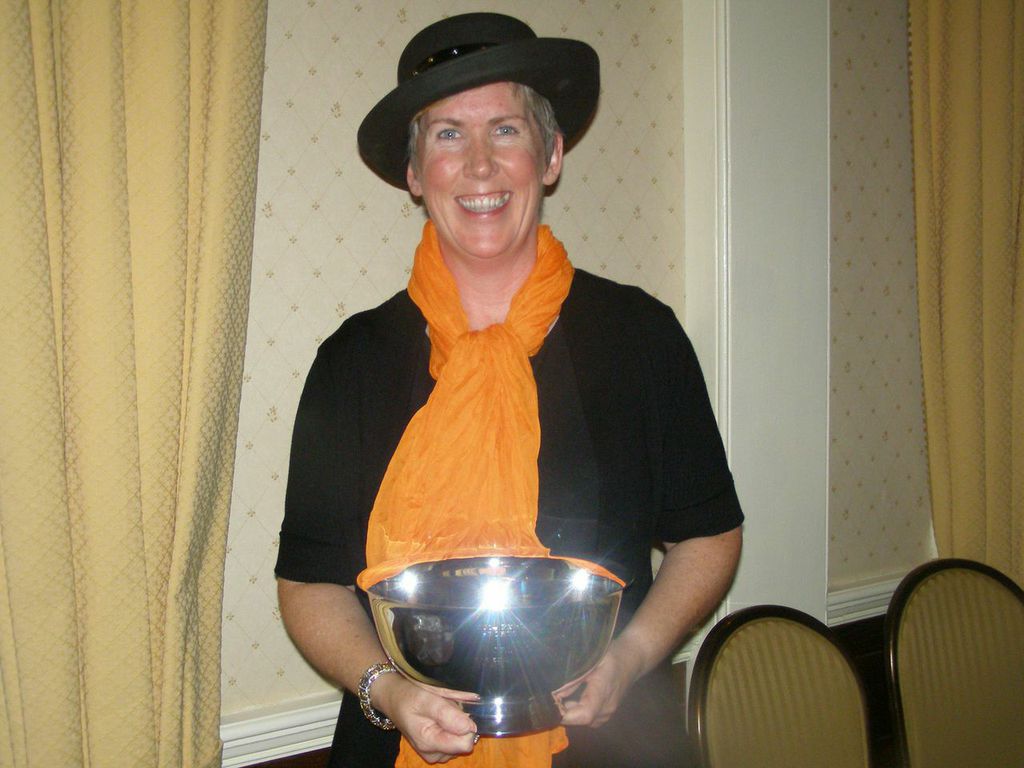
2014 WOMEN’S SPORTSMANSHIP AWARD—ORLA O’DOHERTY
One of the now great Howe Cup traditions is the playing of Abba’s “Dancing Queen” to kick off the dancing at the Saturday night dinner. It was, fittingly, this year’s Sportsmanship Award winner who started that tradition. Orla O’Doherty brings the same ebullience, delight and smooth moves to the squash court that she displays on the dance floor.
Originally from Ireland, the country that she represented at three World Championships, Orla moved to the U.S. in 1993. Discouraged with her squash game, she had stopped playing. In March 1996, Orla happened to visit Las Vegas and decided to have a hit at the club where Amy Milanek, a previous Sportsmanship Award winner, was a pro. “Amy is my squash angel,” says Orla. ”She saw me on the court and instantly started encouraging me to get back into the game. By October, I was playing Howe Cup.”
With her passion for squash reignited, Orla embarked on a career teaching squash, making her way from the Heights Casino in Brooklyn to SquashBusters in Boston to the Fairmount Athletic Club in Philadelphia. She also coached at Cornell, MIT and Tufts. The Head Pro at the Santa Barbara Athletic Club since 2009, O’Doherty also works with participants in the Santa Barbara School of Squash, the area’s urban squash program. Along the way, Orla has also won five age group championships.
Whether teaching or playing, Orla shares the joy that she rediscovered in the game back in Vegas. She is a competitor who leaves her opponents feeling great about their match, regardless of the result. Spectators at her matches cannot help but smile broadly as Orla dances across the court, applauding her opponent’s good play and enjoying her own well-placed shots. “I am so honored and humbled to receive this award,” a very surprised O’Doherty said upon being presented the silver bowl at the Howe Cup dinner. “Sportsmanship is at the heart of what I teach on the squash court, so I cannot wait to share this with all my students. Now, shall we dance?”
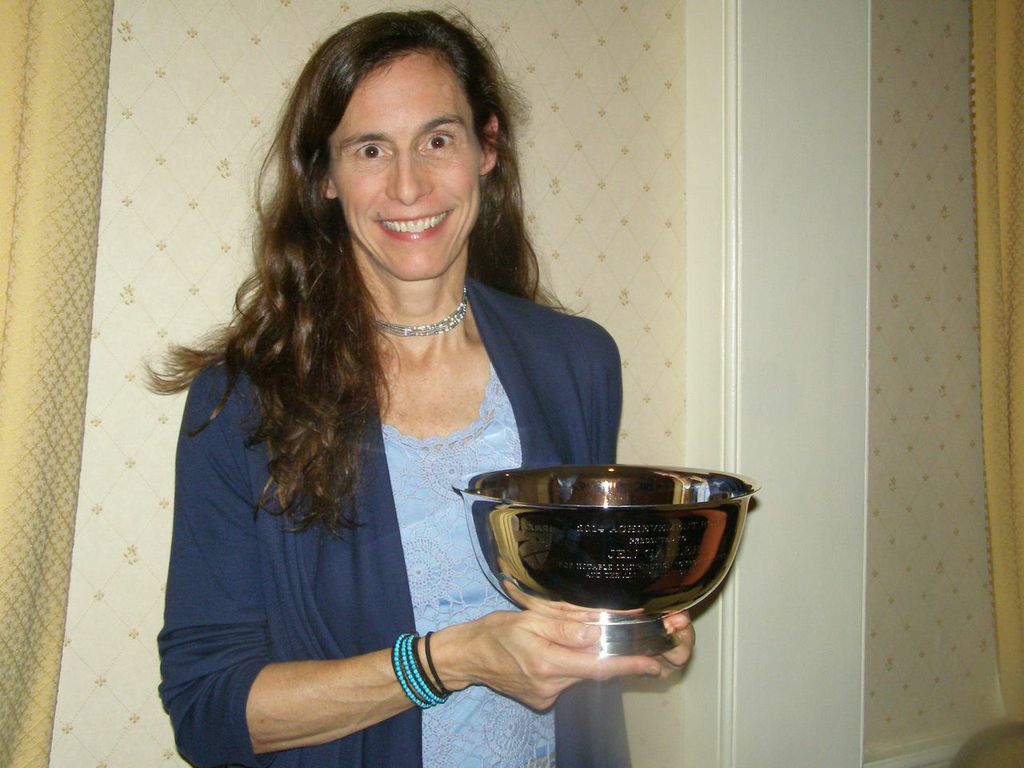
2014 WOMEN’S ACHIEVEMENT BOWL—JEN GABLER
Described by former Dartmouth coach Aggie Kurtz as one of the hardest working and most determined players she had coached, Jen Gabler has brought those same qualities to her role as women’s committee co-chair and champion of the women’s game.
Although Jen stayed in the game initially after college, she eventually stopped playing. A chance encounter in a neighborhood park with another local mom who played squash led to an invitation to get back on court. Although that woman did not actually show up to play at the agreed upon time, Jen proceeded to get on the court and found her passion for the sport again.
Professionally Jen is an outsource Chief Financial Officer working with multiple companies to help them make the transition from precocious startups to going concerns. She brings her career professionalism to her extracurricular squash organizing efforts. When she thought it was important to raise the visibility of women in squash, Jen volunteered to write a series of profiles on women squash players for Squash Magazine. When it was time to have the Howe Cup be hosted in the metropolitan NYC area, Jen served as the Tournament Chair, organizing the involvement of three Westchester clubs and overseeing all the details—from transportation to food to goodie bags—to ensure that the event was an unqualified success. When the Women’s Committee was in need of leadership, Jen stepped up to serve as a Women’s Committee Chair with Kim Clearkin and AJ Copeland to ensure that women are well represented within US Squash. When she got involved with World asters Squash, Jen stepped in to take a lead role in organizing accommodations and communications among the U.S. players. She built a court at her house where she plays with her children and has made it available to dozens of players, often providing them with some coaching as well.
All of Jen’s organizing efforts are accompanied by her infectious enthusiasm and gracious encouragement. “I am so honored to receive this award,” said Jen. “I will always be so grateful for that chance encounter in the park which led to my return to the sport that means so much to me.”
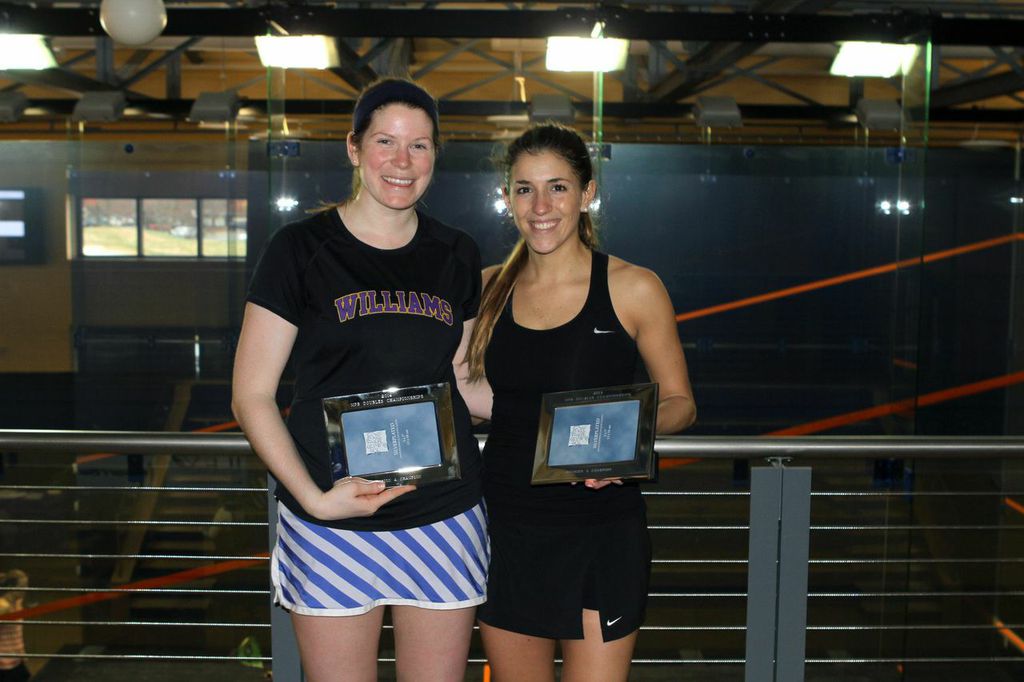
MBP DOUBLES CHAMPIONSHIPS
The most entertaining squash of the Howe Cup weekend took place during the MBP Doubles Championships. The Boston duo of Fernanda Rocha (right) and Allie Rubin (left) were undefeated in the round robin format. Rocha was devastatingly accurate on the left wall which meant that Allie Rubin saw a lot of play on the right wall. Remaining steady and unafraid to hit attacking shots when she had the opportunity, Rubin more than held her own and the Rocha/Rubin team took home the winners’ trophy after defeating Sue Greene and Julie Kessler 3-1, the mother-daughter duo of Pat and Casey Wong, 3-0, and Alicia Rodriguez Acosta and Rhadika Cobb, 3-0. The Wongs, with just the one loss to the winners, finished in second place.
The tall and hard hitting Barker sisters from Parker, Colorado, took no prisoners in the B draw. Dispatching Meredith Johnson and Bry Roskoz in four games in first round play, they then eliminated Debbie Hodes and Sara Smythe in three straight. After dropping the first game to Orla O’Doherty and Beth Rasin in the first game of the semis, Chelsea and Claire regrouped to win the next three for a final showdown with Kim Clearkin and Paulina Rojek. Although Rojek and Clearkin managed to wrest the third game, the Barkers’ speed and power-hitting carried them to the B trophy.
